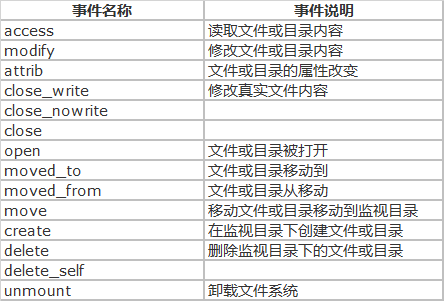一、为什么要用rsync+sersync架构?
1、sersync是基于inotify开发的,类似于inotify-tools的工具
2、sersync可以记录下被监听目录中发生变化的(包括增加、删除、修改)具体某一个文件或者某一个目录的名字,然后使用rsync同步的时候,只同步发生变化的文件或者目录
二、rsync+inotify-tools与rsync+sersync架构的区别?
1、rsync+inotify-tools
a、inotify只能记录下被监听的目录发生了变化(增,删,改)并没有把具体是哪个文件或者哪个目录发生了变化记录下来;
b、rsync在同步的时候,并不知道具体是哪个文件或目录发生了变化,每次都是对整个目录进行同步,当数据量很大时,整个目录同步非常耗时(rsync要对整个目录遍历查找对比文件),因此效率很低
2、rsync+sersync
a、sersync可以记录被监听目录中发生变化的(增,删,改)具体某个文件或目录的名字;
b、rsync在同步时,只同步发生变化的文件或目录(每次发生变化的数据相对整个同步目录数据来说很小,rsync在遍历查找对比文件时,速度很快),因此效率很高。
总结:
当同步的目录数据量不大时,建议使用rsync+inotify
当同步的目录数据量很大时(几百G甚至1T以上)文件很多时,建议使用rsync+sersync
三、安装配置
1、配置xinetd
a)、配置xinetd
vim /etc/xinetd.d/rsync
# default: off # description: rsync file transfer daemon service rsync { socket_type = stream protocol = tcp wait = no user = root server = /usr/sbin/rsyncd server_args = --daemon disable = no }
b)、重启xinetd
service xinetd restart
2、配置rsync-server
a)、rsync配置
vim /etc/rsyncd.conf
uid = root gid = root log format = %h %o %f %l %b log file = /var/log/rsyncd.log pid file = /var/run/rsyncd.pid hosts allow = 60.24.64.0/24,127.0.0.1 read only = false list = false [xue] path = /xue comment = An Example auth users = work secrets file = /etc/rsyncd.secrets
b)、密码文件/etc/rsyncd.secrets
vim /etc/rsyncd.secrets
work:123
注意:权限为600,属组,属主为root
3、rsync-client配置
a)、配置rsync
vim /passwd.txt
123
注意:客户端只需要密码,不需要用户名,权限为600,属组,属主为root
b)、验证
rsync -auvzP /data/ work@127.0.0.1::sunfcbp/ --password-file=/passwd.txt
4、安装sersync
a)、下载sersync
地址:http://sersync.googlecode.com/files/sersync2.1_64bit_binary.tar.gz
b)、解压,移动
tar xf XXXX
cp -R sersync /usr/local/
c)、配置环境变量
echo "PATH=$PATH:/usr/local/sersync" >>/etc/profile
source /etc/profile
d)、配置sersync
<?xml version="1.0" encoding="ISO-8859-1"?> <head version="2.5"> <host hostip="localhost" port="8008"></host> <debug start="false"/> <fileSystem xfs="false"/> <filter start="false"> <exclude expression="(.*).svn"></exclude> <exclude expression="(.*).gz"></exclude> <exclude expression="^info/*"></exclude> <exclude expression="^static/*"></exclude> </filter> <inotify> <delete start="true"/> <createFolder start="true"/> <createFile start="false"/> <closeWrite start="true"/> <moveFrom start="true"/> <moveTo start="true"/> <attrib start="true"/> <modify start="false"/> </inotify> <sersync> <localpath watch="/a/"> <remote ip="127.0.0.1" name="xue"/> <!--<remote ip="192.168.8.39" name="tongbu"/>--> <!--<remote ip="192.168.8.40" name="tongbu"/>--> </localpath> <rsync> <commonParams params="-artuzPv"/> <auth start="true" users="work" passwordfile="/passwd.txt"/> <userDefinedPort start="false" port="874"/><!-- port=874 --> <timeout start="false" time="100"/><!-- timeout=100 --> <ssh start="false"/> </rsync> <failLog path="/tmp/rsync_fail_log.sh" timeToExecute="60"/><!--default every 60mins execute once--> <crontab start="true" schedule="600"><!--600mins--> <crontabfilter start="false"> <exclude expression="*.php"></exclude> <exclude expression="info/*"></exclude> </crontabfilter> </crontab> <plugin start="false" name="command"/> </sersync> <plugin name="command"> <param prefix="/bin/sh" suffix="" ignoreError="true"/> <!--prefix /opt/tongbu/mmm.sh suffix--> <filter start="false"> <include expression="(.*).php"/> <include expression="(.*).sh"/> </filter> </plugin> <plugin name="socket"> <localpath watch="/opt/tongbu"> <deshost ip="192.168.138.20" port="8009"/> </localpath> </plugin> <plugin name="refreshCDN"> <localpath watch="/data0/htdocs/cms.xoyo.com/site/"> <cdninfo domainname="ccms.chinacache.com" port="80" username="xxxx" passwd="xxxx"/> <sendurl base="http://pic.xoyo.com/cms"/> <regexurl regex="false" match="cms.xoyo.com/site([/a-zA-Z0-9]*).xoyo.com/images"/> </localpath> </plugin> </head>
inotifywait events事件说明

e)、同步
sersync2 -r -d -o /usr/local/sersync/confxml.xml